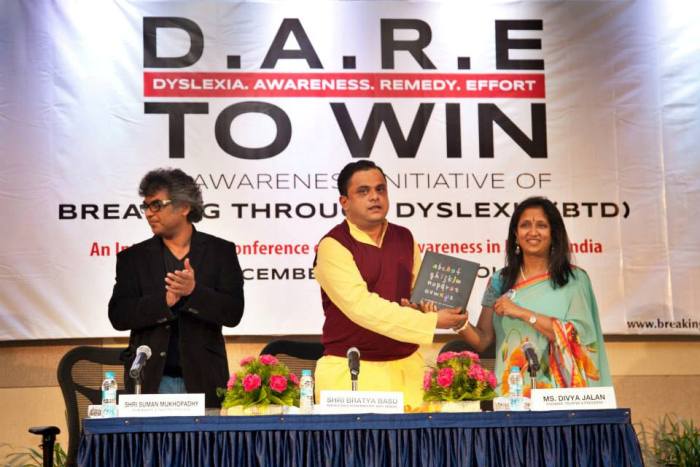International Conference on Dyslexia
Nee 'Breaking through Dyslexia', an international conference at KAn international Conference on Dyslexia was organized by Breaking through Dyslexia (BTD)
An international conference at Kolkata from 17 to 19 December 2013. It was the privilege of Ms. Sukhmeen Cheema, senior Psychology teacher and myself to attend, representing our School.
The aim of this conference was bridging the gap between academic researchers and practitioners, schools, parents and students. It covered all the aspects of research related to dyslexia, including identification, intervention and support for children. The speakers were from the U.S. A. as well as from India, namely,
Dr. Margaret Jo Shepherd Professor Emeritus, Teachers College, Columbia University, U.S.A.
Dr. Eileen Mazola, Ed.D Teachers College, Columbia University, U.S.A.
Dr. Dolores Perin, Ph.D., Teachers College, Columbia University, U.S.A.
Mrs. Ratna Dalvi M.Ed. (Sped)-Learning Disabilities, Post graduate Diploma in Counseling Psychology.
Dr. Reena Sen, Ph.D. Executive Director of the Indian Institute of Cerebral Palsy Kolkata
Dr. J.R. Ram MBBs, MRC Psych, (UK), MD (NIMHANS, Bangalore), CCST (UK)
Senior consultant and Psychiatrist at Mental Health Foundation Kolkata, India.
[gallery columns="2"]
The conference was titled D.A.R.E TO WIN or Dyslexia Awareness and Remedial Effortswith the intention of increasing awareness towards this disability and the efforts that need to be taken to help children touch their potential.
At the opening ceremony, the Honble Educational Minister of West Bengal Shri Bratya Basu released a special book on dyslexia. A film Wings to fly was shown by renowned filmmaker and theatre director Shri Suman Mukhopadhyay
There were the following sessions at the conference:
1. Dyslexia in perspective.
2. Inclusive set- up for holistic education.
3. Understanding how children learn to write.
4. Assessment.
5. Mind the Gap.
6. Panel Presentation
A summary of the sessions is given below:
1.Dyslexia in Perspective: This session outlined
a. What Dyslexia is: Dyslexia is a Specific learning disability that is neurobiological in origin, characterised by difficulties of accurate word- recognition and by poor spelling and decoding abilities.
A case study published in 1927 of a 12-year-oldgirl enrolled in grade 5 was discussed.
A.B. was brought by her parents to the Child Guidance clinic at Letchworth village because she was failing every subject in school except arithmetic. The psychological examiner chose
to take an intelligence test that required some reading.
A.B. could not read words like you me or simple sentences like, Give the book to me or Who am I?
When asked to spell Just,few,school, and father,
she wrote gast, fads, skold and janr.
When asked to write the sentence, Father comes home at night.
She wrote Frinr cas hin at nite.
b. Characteristics of dyslexic reading in English:
- Dyslexic adults read text slowly despite years of special instructions in reading and spelling.
- Single word reading remains slow even for familiar words.
- Dyslexic readers rely heavily on context and vocabulary knowledge to identify unfamiliar words.
- The eyes of a dyslexic reader frequently move backwards and forwards through text.
- Accurate spellings remain a major problem.
2. Inclusive Set up for holistic education: This session outlined how special educational professionals adopt a whole school approach, where all staff members are involved in promoting inclusive practice and it does not remain the responsibility of only a few members.
3. Understanding How Children learn to write: This session outlined an overview of writing
ability including the nature of writing processes (planning, drafting, revising).
4. Assessment: This session outlined the assessment that takes place in classrooms, clinics and professional offices for students who are struggling to learn to read and spell.
The focus was on assessment as the vehicle for monitoring dyslexic students progress learning to read and spell.
5. Mind The Gap: This session addressed the emotional and academic implications of undiagnosed and mismanaged specific learning difficulties. Although often treated as separate boxes the two aspects- emotional and academic are inter-related and interdependent. Just as we
realize that ones mental and physical health cannot be separated, we must also realize that one's emotional status interfaces with the intellectual capacities and performance.
6. Panel Presentation: In this session the panelists answered questions submitted in advance by conference participants. Questions from the floor were also answered.
Dr. J.R. Ram Senior Consultant Psychiatrist at Mental Health Foundation and Apollo Gleneagles Hospital, Kolkata gave the final talk:
All concerned groups must respect the fact that person with disability, overt or covert, must DARE TO DREAM, and have rights to aspire to climb to the most dizzying heights.
The same as anyone else. It is our role to keep their dreams alive and show the way, step by small step
This Conference was very informative and we assimilated many things which we plan to practice and implement at our School.
Filed by Ms.Madhuri Rajdev, Special Educator













